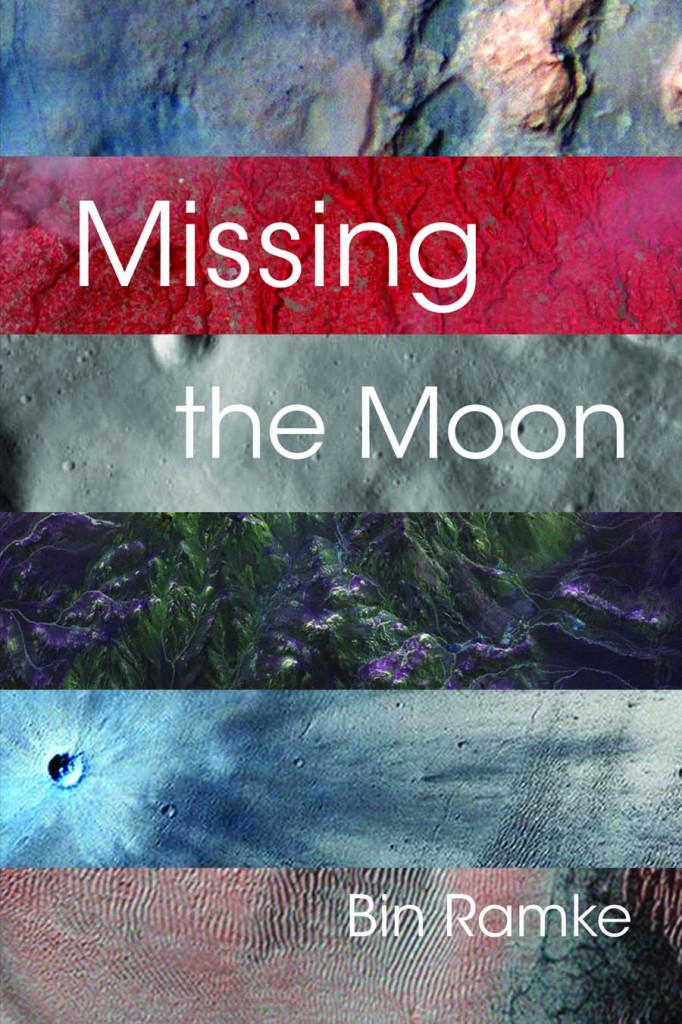Book Review
I want to begin this review by urging you to please just purchase Bin Ramke’s Missing the Moon and read it yourself. It seems foolish for me to even try to describe the depth and profundity of this collection. But maybe you don’t trust me or maybe you just love reading book reviews, so I will do my best to talk about a book that has moments like this throughout its entirety: “contain is what a body does / until it doesn’t and spills itself”; “Contain is what a body does / until it doesn’t then spells itself.” The fact that these lines come from two separate poems shows how interwoven this entire collection is. It is a body that spills and spells itself over and over again, trusting sound over semantics as it investigates a world that is “so, broken, becoming.”
This collection is divided into three sections—“The Inconceivable,” “Phases of the Earth,” and “Pronouncing the Asterisk”—which are each interspersed with epigraphs and allusions to philosophy, science, and art, showing how integral each is to the study and understanding of the other.
This interpenetration of subjects reflects Ramke’s attention to what holds things together—how a syllable or phoneme forms the kernel of “meaning,” and that it is his job as a poet to sow that kernel in as many different terrains as possible. His trust in sound reflects a trust in nature and an understanding that the human is a part of the world, forever involved in a conversation that “allows particulate sand its say: / say its sound, susurrant.” The echo of the “s” sound in these lines is one of many instances in which these poems are led by sound and movement, trusting that “meaning” lies therein.
Ramke’s attention to the most elemental aspects of word and world allows an opportunity for slippage in semantic meaning, a fact he addresses outright in his poem “Mean also Means” in which he plots a type of origin story for meaning:
By a predicabile Albertus Magus means:
a thing of which something is or can be said.
I Ching says:
A bird takes flight, leaving its call behind.
…
This was in the time of the birth
of the gods. Meaning came later,
meanness.
“Meaning” in all of its, well, meanings, is an important concern throughout the book. The idea that intentional “meaning came later” is one that this book seeks to live inside, to try and live by.
In another poem, “After Audubon,” the speaker considers how birds are “named for a sound,” and pursues that way of interacting with the world: “To be named for the sound you make, Poet, / without intent, without meaning.” The speaker cannot even finish this thought—what it would be to be named in this way—the poem ending on this unfulfilled desire.
But Ramke does not simply address the difficulty of saying what one means, or meaning what one says. He goes beyond this timeless concern to also examine “mean” mathematically—what is the mean between two places, two objects—and how might we live in this “in between” space. In “Solve General Boundary Value Problems (Hilbert’s twentieth problem, an elegy)” he writes:
To have a child is to pose the problem. Solve
for X. For Y. Forever. When a thing is next
to another thing, is there a between thing,
and what shall we feed it, when will it be tamed?
…Consider
any family, distance define. Between any two
members a third may intervene; the measure
of closeness is casualty, causality
What is this “between” thing that mathematics and poetry and everything in between seem to be getting at? This “center” between the immoveable boundaries of life and not-life that has been “emptied by one’s own birth” is what the theorem of these poems is trying to “solve” for. However, it seems that “solving” here is an unending process, as the “problem” is extended by the continual creation and decreation of life: “in other words when my brother dies my father was already / dead my mother soon to follow. All have similar stories / in the end, those not already orphaned.”
If this center continues to be “emptied,” the solution never solved, then the only answer seems to be living as the worm does: “the continuous space / you have made in the world by living a life, any life…eating dirt which opens / the way under obstacles…Hole structures: if nothing can have a structure / then anything can and does and is a poem.” The homonym of “whole” here further complicates this notion of the poem, of a life, which the speaker calls “this little languishing between space and other space.” It seems that one might near the solution to this “general boundary value problem” if one could figure out how to live a life between these boundaries that simultaneously fills as it empties—that as the worm makes its way through the dark eating and emptying, leaving and filling, we might do the same via the poem.
Each of the poems in this collection does feel like a type of “hole structure”—a cave in which sound echoes continuously, and in doing so, fills this hole. For to make a sound, to attempt to record it, is to “mean” in this collection; in its radar-like quality, we see and hear how sound bounces off of the world, locating for us the spaces in between our bodies and the world where “The breath obstructed becomes the poem.” This collection shows us how the poem’s purpose isn’t to contain or reflect or make sense of the world, but to be the edge that the world spills over.
About the Reviewer
Kristin George Bagdanov is an M.F.A. candidate in poetry at Colorado State University, where she is a Lilly Graduate Fellow. Her poems have recently appeared in The Los Angeles Review, Image Journal, 32 Poems, CutBank, and Rattle. You can read more of her work at www.kristingeorgebagdanov.com.
